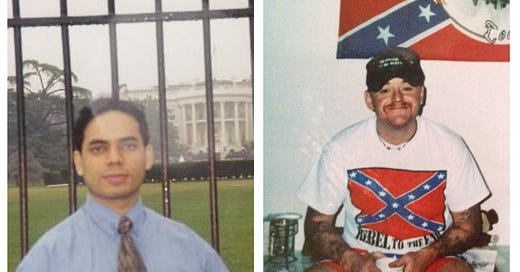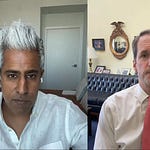If you’re only just tuning in, I recently announced that I’m serializing the opening chapters of my second book, “The True American,” over the coming days here. The introductory post explaining this virtual book club is here. Today, the second installment in the series.
LEAVINGS (continued)
The fortune reached back half a generation, to the middle 1980s, in the years before the great cyclone. It fell on a young man from a household well prepared for it: an educated and devout upper-middle-class family that pursued its this-world and next-world ends with comparable devotion.
Rais’s father was an engineer for Bangladesh Telephone and Telegraph. He rose steadily through its bureaucracy, where he performed various duties, including helping less capable countries build their communications infrastructure. The work gave his family a comfortable, gated life. His forebears came from Sylhet, to the northeast, and Assam, in what was now India. In Dhaka, he had been one of the early settlers of an area called Dania — a tranquil suburb of the teeming, honking, sweaty capital, just south of the Chittagong highway. The father had arrived in the neighborhood well before the ’71 war of independence, back when the area remained full of paddy. He was ever engaged in the community, and this commitment became important to Rais’s conception of his father: a man who was so much more than his day job, who was always asking what else could be done — whether working to set up a primary school in Dania, or aiding candidates for Parliament, or running the neighborhood welfare trust, which kept the streets clean and the drains swallowing.
Rais’s parents had married in the traditional, arranged way. At least compared to the father, Rais’s mother was of a more religious bent. Rais described her in the generic, uncontroversial way that women in her milieu were so often cast. She was soft-spoken, modest, deferential to others. If she had a flash of pride, it was about being unlike those housewives who went over to neighbors’ sofas at the merest impulse to gossip and judge. But her network stretched far into the city, where her family had been settled for generations. Her ever sweeping radar maintained hourly awareness of such facts as whose daughter was marrying and whose father had fallen and whose roof had caved in and brought unpayable bills. Rais idolized her, and perhaps the highest praise he could offer was that no one could detect that three of her eight children weren’t really hers: they belonged to her husband’s first wife, who had left prematurely for heaven.
Though the Bhuiyan family’s self-conception was of simplicity and piety, they lived in relative privilege, in a walled house on a quiet street. Rais remembered only three-wheel rickshaws plying it, not the belching trucks and buses that polluted the capital’s less rarified streets. In the springtime, Dania offered that thrilling rarity in Dhaka: bird chirps you could actually hear. Mindful of their advantages, fearful of God, devoted to His way, the Bhuiyans sought to please Him and ward off envy through ceaseless charity to the world beyond the walls.
This charity was not of the United Way variety. Sometimes it took the shape of distant relatives — or “relatives” — showing up, sitting in the drawing room and, over snacks and juice, telling stories that inevitably landed in an explanation of, say, why they couldn’t afford the wedding that was nonetheless happening next week. A wad of cash might then be given, or a spare sari, or a table no longer in use. In the style of their part of the world, they said it was their honor. It was, of course, also a way of ensuring that, if God ever changed His mind about you, you too would have drawing rooms to sit in and people to tell your story to. When the family didn’t know the seekers, they would wait at the front gate. Rais or one of the other children would stand inside and listen to the visitors’ tale, vetting it, bringing it to the parents, and ferrying back any offerings.
Rais grew up on a Gregorian calendar heavily punctuated by special days from the lunar Islamic one. The dates of exams to study for and school applications to fill out mingled with the dates of rites and sacrifices and family get-togethers. Rais liked to emphasize that many of these days involved charity, and especially the giving of food. On the tenth day of Muharram, for instance, the family would cook a vat of khichdi in the front yard, enough for many dozens. Rais remembered the smell attracting a queue of the hungry, who, when it was ready, were admitted through the gate — and allowed, when they asked, to take some for their families as well. On Thursdays, Rais’s grandfather Hassan Ali led the household through a ritual of self-purification and prayer. It was important to do it on that day, Rais believed, because Thursdays were when the angels whom God sent to check on us beamed their reports skyward. The family performed ablutions, then sat in a circle listening to the grandfather speak from the hadith. They would rinse their hearts, as Rais liked to think of it, through whispered repetition of the dictum that there were no gods but theirs.
Little Rais was known to his family as Ripon. He was born in September 1973 and was the seventh of eight children, easily lost in the family bazaar. But he often behaved, even as a boy, as though in possession of a secret understanding that he was special, somehow marked — much as he came across in a story he told about his brother and the cadet college.
As Rais recounted it, one of his elder brothers had dreamed of studying at a prestigious military boarding school. But the Cadet College of Sylhet saw thousands of applications each year, and just a tiny fraction passed through the filters of the written, oral, and medical tests. Rais’s dada applied and failed. Rais remembered watching his mother dim with despair. The brother was a very good student, and if he couldn’t make it, the prospects of her whole flock became questionable.
“I don’t see who can do it,” she snapped one day.
Rais was too ambitious and too dutiful not to recognize an opportunity. “Mom, don’t give up,” he said. “I think I can do it.” He vowed to calm her by avenging his brother’s rejection. And this vow, as he narrated it, spoke of Rais’s emerging character: on one level, the sacrifice and self-denial, the willingness to shelve any plan and scale any mountain for the family; and, on another, his early intuition that the strings tying down others need not bind him. He was in the fourth grade.
Two years later, it was time to act on that old promise. Rais studied for the exams for as many as sixteen hours a day in searing heat, with two of the family’s fans deployed to cooling him. He attended a coaching class in the winter and stuffed himself full of the lessons found in textbooks custom-made for aspiring cadets. He took the exam early in the new year. When at last the verdict came, it offered admission. Rais hoped the news would restore the family’s confidence.
“I remember the day I was selected, I told my mom, ‘Never give up. That my brother couldn’t do, that doesn’t mean that no one can do. You should not give up. You should try. I tried, and God helped me.’ ” These were Rais’s lessons from the incident: to try and try; and, no less, never to confuse the fate of others with his special own.
When he got into Sylhet, the first victory in his streak, his mother could have filled a teacup with her tears. They were of joy, but also of anxiety about her Ripon’s moving a full day’s train journey away. “You are happy; I am happy, too,” she said. “But I’m going to lose you.”
Among the complications of Rais’s approach to life was this: chasing a thing with such fervor could distract you from considering what the thing, once captured, would be like. On joining day at the Cadet College of Sylhet, in the spring of 1986, little twelve-year-old Rais sobbed. A seventh-grader and brand-new cadet was beginning to realize what he had committed to in trying to please his mother. Like a stack of old family letters, precious but without use, he would be lock-and-keyed away in this cupboard for six whole years. Rais’s dada, the rejected one, must have had his own complicated feelings about having to accompany Rais on the Surma Mail train to Sylhet, 150 miles to the northeast.
The cadet college was a universe unto itself, insulated from the larger country, with its own cinema, mosque, hospital, and dormitories — not to mention courts and fields for basketball, soccer, hockey, tennis, and volleyball. Its rituals were designed to harden boys and, equally, to apprise them of their mutual dependence. They awoke before six every morning, starting out with calisthenics and a run on some days and mock military parades on others. After the younger boys went to class, their dorm rooms underwent inspection by the seniors, who made sure that bedsheets were tucked tightly-tightly under mattresses and shoes lined up heel to heel to heel. Failure on this score or various others brought swift and bracing punishment: perhaps frog jumps while holding your ankles, or push-ups in the hallway, or rolling yourself across an open soccer field. For the crime of speaking out of turn in the classroom, the penalty might be a tugged ear or thwacked buttock.
“Military school taught me lot of things: discipline, team-building, leadership, patience,” Rais said. He remembered everything being very precise. After classes and athletics, the boys had two hours, and only two, for homework. Then came dinnertime, to which they had to walk in formation, as Rais recalled it: “Not just walk on the street, holding hands or gossiping, chatting loudly — not like that. You go in a nice formation on the side of the street, where you walk in a line, and the leader” — typically, one of the seniors — “he makes sure the discipline is maintained and nobody makes any kind of chaos.”
In general, the cadets left the campus only on Thursday mornings, for a race of about three miles up Airport Road, past the small airfield, into some tame hills and back. Guards stood along the route to protect the future soldiers of a newly independent republic and to ensure that they weren’t making too much mischief.
Rais sought to be guarded in his self-admiration, but he made an exception for his prowess as a runner at Sylhet. “From grade seven, I used to always come at the beginning of the race,” he said. He still remembered the seniors taking wary note of a boy many years their junior finishing within a few feet of them: “It was amazing thing. They said, ‘Wow, this kid is something.’ ” Rais grew slightly embarrassed by his retelling: “I should not be talking more on this, but I got attention by that. From seventh grade to twelfth grade, I was always on the first row.”
He recalled with special fondness the day when he was in seventh grade and an eighth-grader injured himself and had to pull out of the 600-meter run. Somebody suggested Rais as a substitute, despite his relative youth. The cadets belonged to rival “houses,” which competed to accumulate points through the school year. Rais’s Shahjalal House needed him to come in fourth, fifth, or sixth to secure enough points to win the day. Rais convinced an eighth-grader in the race to take a junior under his wing and help him achieve that goal. The eighth-grader agreed, and so Rais followed him around the track for most of the race. On the homestretch, with the finish line drawing within sight, Rais decided to sprint, even as his eighth-grade buddy languished, “completely out of his stamina.”
“I came first,” Rais said. “That was a disaster and that was a happiness as well, because it was a shock to the entire school that a seventh-grader who was sitting on the sidelines — he came first.” He still chuckled thinking of the eighth-graders who confronted him back in the dorms: “Who told you to come first?” He said, “It was a shame for the eighth grade; it was a joy for the seventh grade. People are holding me above and laughing and dancing, saying that, ‘You broke the history today. No seventh-grader did this in history.’ ’’
When Rais told a story like this, sometimes he would catch himself and tell another, contrary one. Thus the tale of his 600-meter upset led to one about the limits of talent.
Rais said he learned, while ascending into seniority, that running his fastest kept his house from winning. He would finish early and secure applause and sometimes a medal, but the late finishers on his team prevented personal triumph from becoming collective victory for Shahjalal House. He found that if he ran more slowly, he could stick with them and galvanize them as they ran, goading them toward the finish line. Very often it worked. “If I give up my medal, if I bring these kids in front, it made my house go up,” he said.
This was one of Rais’s major lessons from that time — and it related to another lesson once imparted to him by a harsh teacher. The teacher pulled his ears and spanked him because of a noise in class that was in fact bleated by Rais’s neighbor. When Rais later went to the teacher to protest the injustice, his teacher responded that, as with a contagious house fire in a congested quarter of Dhaka, in life sometimes you get burned for no sin of your own, simply because of where you’re standing.
After six years at the college, Rais graduated. He came out feeling pulled this way and that by rival goals. He had dreamed of being an airplane pilot at least since he accompanied his father to Dhaka airport as a boy and watched the sky swallow him up and take him away to the Arab Emirates. In time the dream had grown more vivid: he wished to attend the Bangladesh Air Force Academy. But this vision now had to compete with another, inspired more recently by returning alumni of Sylhet, who visited the school to give pep talks about the world beyond it. The most impressive of them had gone off to America for higher studies. This appealed to Rais, too. The best approach, he felt, was to pursue both ambitions at once and defer to God’s preferred timetable. “If I don’t get to this dream, maybe that’s the next one,” he said. If not piloting here, then studying in America.
Rais cast his entry into the Air Force Academy as another story of improbable triumph. He reckoned himself to be among the shrimpiest of his classmates, short and slender, which he imagined would make it difficult to pass the academy’s extensive scrutiny and testing: “It’s very hard to go to Air Force, because it’s very limited openings. You have to have a very good health, very good vision, and also have to be highly talented. Your IQ has to be more than 175.” Setting aside that possibly inflated figure, the Air Force did have a reputation for difficulty, which led Rais to this observation about his peers: “Those who want to escape the military, they choose the Air Force, because they will be kicked out.”
But Rais made it through the exams, and then three months of grueling joint-force training in southern Chittagong, where he lost so much weight — his cheeks looked sunken, his eyes darkly recessed — that his visiting mother wept at the sight of her little skeleton. Rais fractured his wrist two months into the three-month program, but he told no one. He was stubborn, and he feared falling behind in the daily points tally or being removed; the important thing was to keep moving. He pushed himself ever harder in the mile tests and, as at Sylhet, found success: “I was coming first every single day.” Once again, it seemed to Rais proof of some special destiny.
When at last he saw a doctor for his wrist, two weeks before the training’s end, he received a scolding and some damning news: “Your hand will never be OK. You took such a long time to come back and the fracture has spread so much, it’s very unlikely that you’ll be able to get it back the way it was before.”
But this was, as ever, just the prelude to the story. The wrist did heal, and after three months in a plaster cast and a suspension of his training, Rais formally enrolled in the Air Force Academy.
The next victory involved the undoing of the last. Rais put in two and a half years at the academy in Jessore, studying aerodynamics and navigation and meteorology, collecting dozens of flight hours learning to pitch, roll, and yaw in Chinese-made PT-6A prop planes. He received his commission as a pilot officer. Then, a few months in, while undergoing further training in radar and air defenses, he simply changed his mind. If not this dream, then the other one, he had once said. The other dream — studying in America — had again begun to nibble on and whisper in his ear.
Rais described the change as a natural evolution of his ambitions. Still, it was an abrupt and uncommon shift: men trained up by the military system seldom left it so quickly. Rais couldn’t fully explain what had come over him, even years later. It just became clear that this life wasn’t for him, he said. Maybe it was the two plane crashes — one killing a teacher Rais knew, the other a fellow student. Or maybe the sense he suddenly had of whiling away his life cut off from the world — first in Sylhet, then in Jessore, now on base after base. “I was out of my house at age of eleven,” he said. “I missed all the good times from my family — missed all the programs. Now I’m in the military last two and a half years: missed my sister’s wedding, my brother’s wedding, this and that. So now when I am going to have my personal time, some free time — what I wanted to do?” A military future would bring what he called a “tight life.” He asked himself: “Do I really want to lead a life like this?”
As it happened, getting out of the Air Force was harder than getting in. His comrades tried to deter him. One senior officer warned that his likely career alternative was the venal life of a businessman: “If you do business, you have to be dishonest.” Rais would fall from the height of prestige — from the pride of defending Bangladesh, from those government cars and colonial club memberships and foreign educational courses, from that look people give an officer — to its depths. Nothing seemed to convince Rais. Shortly, as per procedure, the air secretary of the country contacted Rais to inquire about his request for a discharge. He asked the young man to come to headquarters and bring his father along.
At the meeting, the official looked to the father: “Can you ask your son what we can do for him to stay?”
Rais was impressed by his father that day. “You raised my son,” Rais remembered his father telling the air secretary. “You made my son an officer the last two and a half years through vigorous training. You made him a gentleman. And I think you also made him enough responsible to take his own decision. As a father, I think I did my part. And now you’re the guardian, and I think you trained him enough. So I leave it unto you and him.”
The official looked to Rais for his final answer. He wanted to go. Within six months, he had his release papers. Rushing to fill the void, a new striving took over: “Next goal: come to U.S.A.”
The above is the second of eight serialized excerpts from “The True American” that will appear in The Ink. Copyright 2014, W.W. Norton.
Part 1.
For the full book, find it below or wherever you get your books:
Indiebound
Audible audiobook
Amazon
W.W. Norton
Apple
Barnes & Noble
Books a Million
Bookshop.org

















Share this post